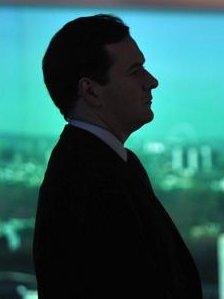Public sector pay reform 'absolute disaster for Wales'
- Published

The Chancellor will deliver his Budget on Wednesday
The chancellor has been urged not to introduce regional pay in the public sector as he prepares to deliver his Budget.
A union representing public sector staff said it would be an "absolute disaster", depriving the Welsh economy of more than £1bn.
George Osborne will also announce a cut in the top rate of income tax.
Welsh Conservative MP Guto Bebb said the cut would be a "difficult policy to sell".
The Budget comes on the day that official statistics show wages in Wales are the lowest in the UK, behind Northern Ireland.
The Office for National Statistics said the median annual income for public sector workers was £21,258 last year - 19% more than the private sector figure of £17,177.
The UK government is examining how public sector pay can be brought into line with the private sector.
But critics say it would mean a pay cut for people in poorer parts of the UK.
Last autumn, Mr Osborne asked independent pay review bodies to report in the summer on whether the public sector could be "made more responsive to local labour markets".
But the Public and Commercial Services Union (PCS), which has members working for the UK and devolved governments, said the proposal would hit Wales particularly hard.
According to the Institute for Fiscal Studies, Wales has the biggest public-private pay gap in the UK.
Women in Wales can earn an extra 18.5% and men an extra 18% in the public sector than they could expect to make working for private companies with similar qualifications, the think tank estimates.
PCS senior national officer Jeff Evans said: "What these figures demonstrate is that regional pay would also be an absolute disaster for the Welsh economy."
'Real impact'
The gap could be only be closed by holding down public employees' pay while wages in the private sector rise in line with inflation, he added.
"The real impact on the Welsh economy would be even greater, however, since the reduced spending power of public sector workers would translate into reduced revenues and wages in private sector businesses that currently benefit from that spending," he added.
First Minister Carwyn Jones has described the proposal as "ludicrous" and as "code for cutting pay in Wales".
New Plaid Cymru leader Leanne Wood on Tuesday night invited him and other Welsh party leaders to unite in opposition to the proposal.
Treasury officials say it would ensure the UK has a responsive, modern labour force.
Growth
They see the move as "pro-growth", saying it would help make the private sector become more competitive.
Mr Osborne is also expected to raise the threshold at which anyone pays income tax to more than £9,000 next year, leaving the average standard rate taxpayer £305 a year better off.
He will announce a cut in the top rate of tax from 50p to 45p, but not for a year.
Payable on income over £150,000, the 50p rate was introduced in April 2010 in what Labour said at the time was a temporary move.
Mr Bebb, Tory MP for Aberconwy, told BBC Radio Wales: "It'll be a very difficult policy to sell in terms of the signal being sent out because clearly when the chancellor says we're all in this together the 50p tax rate was part and parcel of that message.
"It depends upon how it's rebalanced - what other taxes will be brought in to try to counter balance any loss of income as a result of this change."
Mr Bebb said a "timetable for its abolition would be understandable" if the rate was not generating money for the Treasury.
He added that the chancellor "had to make decisions which are right for the financial viability of the country".
- Published18 March 2012
- Published10 January 2012
- Published30 November 2011
- Published29 November 2011
- Published29 November 2011